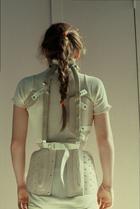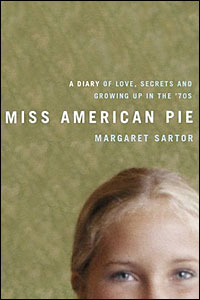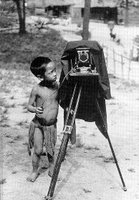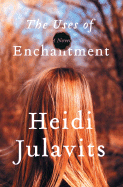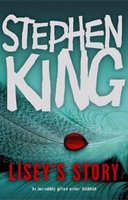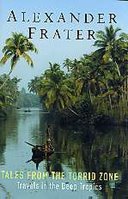
Travel writing: when it’s good, it’s great; when it’s bad, it’s usually written by a Brit. At least that was my conclusion after a quick survey of the two shelves I’ve allotted to the genre.
My introduction to travel writing came in the form of Bruce Chatwin’s books – first translated into Portuguese in the mid-nineties. His “In Patagonia” was partly responsible for my choice of Anthropology as a degree, and therefore becoming utterly useless for the national job market – something for which I should either sue his estate or thank him eternally. Whatever.
Since then, I’ve read a number of travel books and though I’m no connoisseur, at the very least, as they say, I know what I like. This is it:
I like an author who does his/hers historical research, but doesn’t feel compelled to dump it all on the readers, just to prove it. If it’s really boring or incomprehensible, either make it simple and entertaining or just leave it out, for god sake. It’s not my fault you have been stuck at the library for the past eight months.People. If you’re not good at talking to people and getting then to open up, and at thinking about them as human beings just like yourself (like V. S. Naipaul, whose every conversation makes for uncomfortable reading in “The Middle Passage” or “A Turn in the South”), it is better to refrain from travel writing. The British writers suffer particularly from this last affliction, especially when around their old stomping grounds in the East – they just can’t shake the old Empire shadow, I guess.Diversity. Don’t make it all about one subject – history, politics, nature, one person, I like a little of everything. Books with a theme are wonderful, but there is no need to become monomaniacal. In this respect, I think Simon Winchester’s “Krakatoa”, although maybe not a travel book per se, is nearly perfect: it’s got history, geography, geology, botany, biology, anecdotes, personal recollections and a couple of more things (on the other hand his “Map that changed the world” is the exact opposite). Themed travel writing offers its own pitfalls, the most dangerous being when the subject overrides the travels – such as in “Colour – Travels through the paintbox”, by Victoria Finlay, a very accomplished book about the history of pigments, but where the fact that the writer is in India or Spain is largely secondary to the narration, which is focused solely on the processes and people who obtain the pigments, and even so is 438 pages long; one of those cases where you feel the author is telling you absolutely everything she learned during the research stage.Last but definitely not least, humor. Dour and gloomy whiners should be banned from perhaps all writing, but especially travel writing. There’s nothing worse than traveling with someone who is constantly getting aggravated over train schedules, bad food or inconvenient people, and nothing better than being guided by someone who can have a laugh at being cheated, fooled or insulted (Bill Bryson is the man, of course).
And so, rather belatedly, we reach the matter at hand, Alexander Frater’s “Beyond the Blue Horizon”. This was my third Frater, after “Chasing the Monsoon” and “Tales from the Torrid Zone”. Frater is the opposite of monomaniacal. If anything, his books go through so many places and times all at once that the pace is dizzying. It’s not that he explores that many subjects: his favorites throughout remain meteorology, aviation, tropical medicine, with pretty girls and alcohol the two recurring leitmotifs while in transit. Born in the pacific island nation of Tuvalu, his grandfather and father were local celebrities - as much as severe Scot missionaries can be, anyway – who provided the first organized care in the way of medicine, and religion, of course, to the natives. Obliged to leave because of World War Two, the Frater family spent some time in the Fiji, and after studying in Australia the author made his way to the metropolis where he became a journalist, and eventually the Observer’s chief travel correspondent.
That Frater is well traveled there can hardly remain any doubt – he managed to write “Tales from the Torrid Zone”, 378 pages long, and tell stories on forty-one countries he has personally visited, and still mention thirty others. What did I learn about Guyana, Laos or Gambia I can´t recall exactly, but I now know there is a foundry in London where you can order bells, the smallest of which cost around two thousand pounds. The reason I know this is because the most important story in the book is about the author’s generosity in offering his old church in Tuvalu a new bell – not very modest, but for all intents the best episode in the book.
From 1990, “Chasing the Monsoon” is, to my mind, the best Frater. Having a set goal – following the monsoon in India to the final destination of Cherranpunji, “the world’s wettest place”, a pilgrimage his father planned but never made – does wonders for his writing: it reigns him into a specific place and phenomena and still allows him to recount once again his childhood, which was extraordinary.
Goaded by “Chasing the Monsoon” and since there was only one other book by Frater I hadn’t read, I embarked on “Beyond the Blue Horizon”. The Time Out blurb on the cover reads, “You’ll have great difficulty putting this down”. Well I put it down about three months ago, and had to force myself to finish the remaining two-thirds in two days, or I knew I would never get through it. I should say this was Frater’s first book, first published in 1986, and having the others it is undeniable he got a lot better at it.
In “Beyond the Blue Horizon” the writer undertakes to follow, by commercial flights whenever possible, the Imperial Airways Eastbound service of the thirties, London to Darwin. Now, I like airplanes just as much as the next person – which means, I guess, that I might like to read about the experience of flying or about people who are passionate about it, but not necessarily about the technical parts of the process – but this book, 430 pages long, was just too much for me. Part of it, is caused by Frater’s own virtuousness, since he sticks as closely as possibly to the old schedule, and therefore never spends more than, on average, one night in each stop, and doesn’t even leave the airport in about half of the fifty-two stops. It’s all very well if you want to know the name of a lot of airports, their history, and the models of the airplanes on the tarmac on the hours Frater goes trough, and read with him extracts of journals of old Imperial passengers, but for the rest of us, quite tedious. All the interviews are with airport or airline managers or people otherwise connected with modern flying (or a “pretty” or “striking” air stewardess when he gets the chance).

You do get a feeling of how exciting it must have been in the first days of commercial aviation when Frater interviews Mr. Tata, the founder of India Airlines, or the great aunt of the Jodhpur maharajah, or in Australia, where everyone seems to know something about their legendary pilots, but otherwise his questions mostly draw blank stares. Some of what passes for ignorance might be related to the subject itself: Imperial Airways was not, despite what might be inferred, a pioneer of commercial flights. When it was created in 1924, both KLM and France’s Aéropostale had been active for five years, and the regular airmail service was only established in 1937. Many of those who speak to Frater refer Dutch pilots by name, for in those days, they were the heroes of aviation.
The thing that really surprised me about this tour, taking place in the early eighties, is how much of the old colonial flavor could still be tasted, especially from India on. Maybe it’s because Frater was able to sojourn in some pretty amazing places such as the Jodhpur Palace, or the Eastern and Oriental in Malaysia and Raffles in Singapore where Conrad, Maugham, Kipling and others also stayed, but it was painful to read about adult Indians, Bangladeshi, Malayans, and Singaporeans working at the hotels as private valets still referred to by the author as “boys” (albeit between inverted comas). Colonial? I hear you ask – surely not? Well take a look at this passage from when the author arrives at Australia: “ I had grown unaccustomed to the sight of Europeans doing menial work” – sure, it’s worse because I took it out of context, but still, it’s pretty bad.
The historical recollections throughout always feel contrived, as the author forces them into every stop. Maybe he should have stuck with one historical character, a pilot preferably, instead of jumping between passengers and crew. It also doesn’t help that in the journal he most quotes from the journey is being done backwards. The ending feels forced just like in Torrid Zone (there he delivers the bell to the old church accompanied by a lovely young radio reporter who shock! wins a prize with the piece); here, on his last flight, he manages to find a woman who had her maiden voyage on the exact same plane Frater flew as a child, and who his also obsessed with flying boats. Maybe I’m a cynic but it just sounds like too much of a convenient ending.





